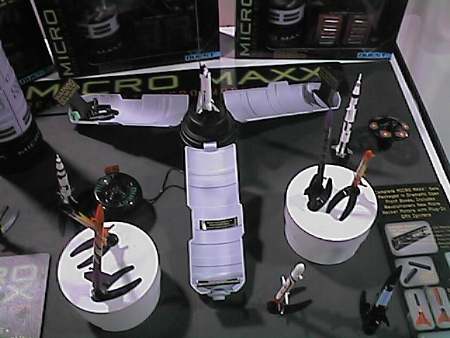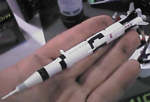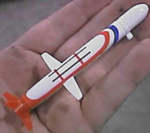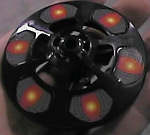| Manufacturer: | Quest  |

 Brief:
Brief:
These are the new Quest Micro Maxx Micro Mini (super tiny), adorably-cute,
plastic RTF rockets. Here is a list of the 10 (I have flown all 10) MMaxx
Rockets: Space Shuttle, SR-71, Saturn V, Tomahawk Cruise Missile, Space
Fighter, U.F.O., and four other 3-Fin-&-Nose-Cone rockets.
Also included is the Quest Silo Launch system with In-Pad Ignitors and Puck Launch Controller.
Construction:
Packaging was very cool, impressive and protective of the contents. If
Toys-R-Us would shelve them more prominently they would really stick out
impressively. Nothing in any of the kits was was broken. All was in order and
included.
One pain is that the ignitors mount onto the Launch Pad and then the rockets slide over this onto the rod. The problem comes with the fact that there are two possible hole positions for the rod to line up with the rockets. But this is not too difficult and easy to modify. You just yank the rod out and insert it into the other hole.
Another CON is the igniters. Although very reliable in my book, they can be a pain if the tip is too thick. If so, when you insert the motor it pinches the igniters leads together down lower, thereby, shorting out the igniter. I found the Saturn V fins are great for sticking in between the leads and then biting the tip of the igniter to bring it more into a point to allow it to easily slide into the engine hole.
 Finishing:
Finishing:
The was no finishing work, however the finish was very cool especially of
course the SR-71. The Saturn V, Tomahawk and Space Shuttle were also cool. The
UFO, as always is awesome looking. They also seem unusually sturdy (hey there
all plastic).
Construction Rating: 3 out of 5
 Flight:
Flight:
All of the rockets flew perfectly straight to about what I would guess to be
around 50 feet (UFO about 15-20 feet). The 3FNC rockets near 60-70 feet and
maybe a little higher. Now a problem with flight - these things are extremely
sensitive to ANY wind - I took them up to my Grandmom's to show them off to the
kids and they would ALL (except the UFO) boost fine but start tumbling toward
end of flight before ejection. I got to thinking and launched the next one
during a lull in the light wind and walla . . . a perfectly stable flight! So,
if there is more than a tiny breeze these things may be hypersensitive to it.
Although it was always at the end of the flight that I had trouble. So heed the
warning in the instructions to fly in 5-7mph wind max. In fact I would stay
under 5mph.
The looks of the Silo Launch Pad was fine. Surprisingly the base of the pad has stood up very well to the exhaust of 10 engine firings with no wear and only some wipeable crud.
 Recovery:
Recovery:
Now to the fun part. Needless to say as most on RMR have already reported the
recovery systems just plain stink. I have only had one piston rocket deploy at
all, while all the others end in ejection of piston. Okay, but no streamer
because it was either not fully out of tube or melted really bad to point
sometimes of it falling off . Now the Space Fighter and Space Shuttle did not
have quite as much trouble especially if I jammed a little wadding in there
(NOT all the way to bottom just under streamer BUT even they melted a little.
The only one with NO recovery problems was the . . . Drum Roll . . . UFO.
Flight Rating: 4 out of 5
 Summary:
Summary:
I gave a 4 for awesome, adorable, cute flights but not a 5 because of the lousy
recovery system. If I could rate them separately I would give a 4 for flight (5
would better handling in wind) and a 1 for recovery. As far as survivability,
it seems to be a little better than I thought. I have flown some of these 3
times each and so far they are still airworthy although I can see inside it
starting to melt etc.. Only time will tell.
The Launch Controller is very cool and cute but the battery is pitiful. I was trying to launch (maybe 5th launch) and it would not launch no matter what I did. I would take rocket off and igniter would glow but would not light engine. Finally I got fed up ripped the wires out (literally) of the controller (I have 3 of them) and hooked up a set of jumper cables and touched the wires to it and walla instant ignition. I fired off 5 more engines with no problems. Needless to say I will be modifying the launch system.
Overall Rating: 4 out of 5
![[NAR]](/images/archive/images/link_nartitle.gif)
![[Sport Rocketry]](/images/archive/images/link_sr_logo.gif)
The following excerpt is
from "Sport Rocketry". The intention is to allow guests to get a
basic feeling about a kit. We strongly suggest that you get a copy of the
referenced Sport Rocketry and read the entire article. Inside you will find
many helpful hints in construction as well as other useful information. For
more information, use the two links above.
(Sport Rocketry - Nov/Dec 1999 - page 38 - by Maxwell Eminussix)
"The micro rockets are perfect for backyard launching and are lots of
fun, but in other ways they don't measure up to the advertising claims."
"All the models feature a twist off base or fin unit for loading the
motor."
"Recovery is by streamer (except for the Alien UFO) and the models
incorporate ejection baffles."
"Some have a standard shock cord arrangement, while others have the nose
cone mounted on a piston-rod assembly which the streamer wraps around."
"The Micro Maxx launcher is a really nice little system. . . . nicely
engineered . . ."
"The Micro Maxx motors are truly cool. . . . just 1/4" x 1" and
they are rated at 0.20 N-sec which puts them low in the 1/8A impulse
range."
"The packaging claims 'flights up to 200 feet' but none of the rockets get
anywhere near that altitude."
". . . it is important to launch these models only in under low-wind
conditions, less than 5-7 mph."
"The recovery phase is where the Micro Maxx designs really fall down . .
"
"The ejection baffling works poorly . . ."
" . . . the streamers often don't unroll . . ."
" . . . or the pistons may break or eject completely."
"In all, the Micro Maxx can be a really fun system for backyard rocketry .
. ."
The entire article gives the impression is that these rockets are good for anyone and the recovery issues are not unsafe and may have work arounds.
 |
 |
Flights
 |
 |
D.F. (January 1, 2001)
2. Stability is an issue, and any wind knocks them for a loop near end of flight.
3. The Saturn V and Space Shuttle both only flew to 15 feet or so. The Saturn V piston did not deploy and let the streamer out, but the rocket is so light and flies so low that it is not an issue. The Space Shuttle streamer did melt in a few spots with no recovery wadding.
4. I put a MM engine in an Estes Mosquito, and flew it successfully from the MM launch system. I wrapped masking tape around the MM engine until it fit snugly into the front end of an expended 13mm motor casing. I then inserted the 13 mm "engine adapter" into the Mosquito far enough so that the nozzle was even with the back of the fins. It then fit on the silo launcher with the rod in the #2 position. It launched fine, but flew a little erratically to about 15 feet. The ejection charge actually propelled the rocket faster than the boost phase towards the ground. Keep spectators back in case it flies towards you. This occurred in the front yard, so you can launch a Mosquito without losing it!
S.E.T. (September 19, 2001)
 |
 |
P.W.C. (February 1, 2000)